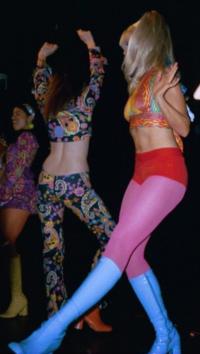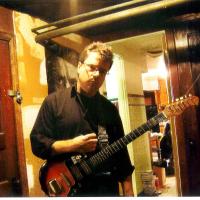 Untitled
Untitled
Here's something that may interest a few people here...
CBGB Is Dead. Long Live CBGB.
By JAMES C. McKINLEY Jr. and STEPHEN REX BROWN
For the last six years the name CBGB has been little more than a logo on T-shirts for young people in the East Village. Now a group of investors has bought the assets of that famous punk-rock club, which closed in 2006, and plans to establish an ambitious music festival this summer, with an eye toward reopening the club at a new downtown location.
The new owners of the club’s assets — some with ties to the original Bowery establishment — say they hope that the festival will revive the wide-open artistic aesthetic associated with CBGB, which in its heyday served as an incubator for influential acts like Television, the Talking Heads, the Ramones, Blondie, Sonic Youth and Patti Smith.
“We’re never going to recreate that moment in time,” said Tim Hayes, one of the investors. “We’re trying to continue the idea of supporting live music, making a lot of noise and being a part of New York City. The festival is one way we can do it. Eventually the club will be another way we can do it.”
The four-day festival is scheduled to begin on July 5 and will showcase about 300 rock bands. Concerts will take place at around 30 places, from large stages like Central Park Summerstage and Webster Hall to small clubs like the Trash Bar in Williamsburg and the
Living Room on the Lower East Side.
The Cro-Mags, Vision of Disorder and Sick of It All will headline a hardcore show at Webster Hall, organizers said. The festival will also stage a free concert in Central Park with Guided by Voices, the Pains of Being Pure at Heart and Cloud Nothings. A few veteran rockers have agreed to appear: David Johansen, a former member of the New York Dolls, has committed to do a show, as has the Baseball Project, the supergroup formed by Peter Buck of R.E.M. and Steve Wynn of Dream Syndicate.
The New York City market has proved difficult for festival promoters, particularly for large, open-air events, like All Points West and Across the Narrows. The CBGB festival, however, will take place mostly inside existing bars and music halls, a more profitable model in the city. Though Mr. Hayes declined to discuss the company’s finances, he said the promoters bought the club’s assets for cash and are not burdened with debt.
The festival will also include screenings of rock-themed films at two downtown cinemas and a series of workshops and conferences geared to artists venturing into the music business for the first time. Mr. Hayes said the models are the South by Southwest music festival in Austin, Tex., and the CMJ festival held here every fall. “We want to make room for some of the legends that came from CBGB, but the primary focus is to support new music,” he said.
It was Mr. Hayes’s commitment to original music that persuaded Lisa Kristal Burgman, who controlled the estate that owned the rights to the club, to sell it to him, she said. “It’s a relief to know that it’s not going to die,” Ms. Burgman said. “It’s going to be reborn.”
That rebirth has been a long time coming. Hilly Kristal, the club’s founder and Ms. Burgman’s father, died of cancer in August 2007. A year earlier, he had shut down the narrow space — a crumbling bar with an angled stage, dungeonlike bathrooms and walls covered in graffiti and fliers — after a long and bitter dispute over back rent with the landlord. He left most of his estate to Ms. Burgman.
But the rights to the club’s assets and its famous trademark, which is worth millions, became mired in legal disputes after Mr. Kristal’s death. Shortly before he died, Mr. Kristal had negotiated a deal to sell the club’s assets to two entrepreneurs, James Blueweiss and Robert Williams. They bought the rights from his estate in May 2008 but then declared bankruptcy two years later. Under Ms. Burgman’s direction, the estate sued to reclaim the club’s assets. Complicating matters, Mr. Kristal’s former wife, Karen Kristal, also filed suit, disputing the sale, saying she had been the rightful owner of the business.
By October 2010, both legal battles had been settled, and Ms. Burgman ended up in control of not only the club’s famous logo, but also its memorabilia and its grubby interior furnishings. Several would-be buyers approached her, she said.
She started talking to Mr. Hayes, a concert promoter, about his interest in reviving the club in early 2011. Her main concern, she said, was to ensure that Mr. Hayes and his partners would carry on her father’s policy of supporting original, undiscovered musicians.
“What was important was to make sure that whoever bought it understood what CBGB was about, and Tim did from the get-go,” Ms. Burgman said.
Neither Mr. Hayes nor Ms. Burgman would reveal the terms of the sale. But buying CBGB — and the cultural cachet, lucrative licensing rights and merchandise that come with it — was almost certainly not cheap. When the Kristal estate sold the rights to the club in May 2008, the price was $3.5 million, according to bankruptcy records.
Mr. Hayes said there were at least six investors behind the new venture, whom he declined to name but described as “a half dozen guys that just love music.” One of them is Joe D’Urso, a musician and a former talent agent who is now working to organize the festival. Ms. Burgman said she had no financial stake in the festival, nor in the future club, though she is continuing to advise the new owners. “It’s passing the baton,” she said.
Mr. Hayes has hired others with close ties to Mr. Kristal. Louise Parnassa-Staley, the booker at the club from 1986 until its closing, has the same responsibilities for the coming festival. She said she had received inquiries from a wide variety of rock groups, from a black-metal band in Norway to a heavy-metal band in Mexico and a “surprising amount” of roots-rock bands.
Eventually, Mr. Hayes said, he and his partners intend to reopen the club in Lower Manhattan and are searching for an ideal building to buy. “We don’t want to be a tenant,” he said. “We don’t want to be a victim of what happened before.”
Some people with ties to the old CBGB expressed skepticism the club could be resurrected without Mr. Kristal. “The people who bought it are wonderful people, but to me, the place died with the man,” said Richard Manitoba, the lead singer of the Dictators.
James Sliman, who managed the Dead Boys in the 1970s, said he was waiting to see if the new owners had Mr. Kristal’s “musical integrity” or were “doing this just to cash in on the name.”
The new club, if and when it opens, will have most of the trappings of the shuttered club at its disposal: A theatrical company dismantled and itemized everything from the bar itself to set lists and put it all in storage in Williamsburg, Brooklyn.
But Mr. Hayes and Mr. D’Urso said they did not want to open a “museum installation” aimed at tourists. They hope to re-establish CBGB as a vibrant downtown club that will present original bands.
“Rock is an art form that I love and respect, and I think has a purpose in the social fabric of our society,” Mr. D’Urso said. “And it’s been a little pushed aside. If we can help push it back in, we’d like to.”









